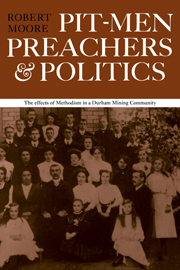Book contents
- Frontmatter
- Contents
- Dedication
- Acknowledgements
- List of abbreviations
- Introduction
- 1 Historical background
- 2 The Deerness Valley
- 3 The social and economic basis of paternalism: the colliery-owners in the Deerness Valley
- 4 Village Methodism – I
- 5 Village Methodism – II: the structure of the Methodist societies in the Deerness Valley
- 6 The respectable Methodists and the old Liberalism
- 7 The radicals and the Labour Movement, 1900–1926
- 8 Methodists in action: three political case studies
- 9 1970 – a postscript
- Conclusions
- Appendix I research strategy and techniques
- Appendix II the Methodist community and objections to Anglican union
- Appendix III the religious statistics
- Appendix IV occupational status, social mobility and the structure of Methodist leadership
- Notes
- Bibliography
- Glossary
- Index
- Frontmatter
- Contents
- Dedication
- Acknowledgements
- List of abbreviations
- Introduction
- 1 Historical background
- 2 The Deerness Valley
- 3 The social and economic basis of paternalism: the colliery-owners in the Deerness Valley
- 4 Village Methodism – I
- 5 Village Methodism – II: the structure of the Methodist societies in the Deerness Valley
- 6 The respectable Methodists and the old Liberalism
- 7 The radicals and the Labour Movement, 1900–1926
- 8 Methodists in action: three political case studies
- 9 1970 – a postscript
- Conclusions
- Appendix I research strategy and techniques
- Appendix II the Methodist community and objections to Anglican union
- Appendix III the religious statistics
- Appendix IV occupational status, social mobility and the structure of Methodist leadership
- Notes
- Bibliography
- Glossary
- Index
Summary
The intention of this study was to add to the sociology of religion by analysing one Methodist community in sociological terms. There are two major areas of sociological theory to which it relates directly, and which were mentioned in the Introduction: firstly, the Protestant Ethic thesis and secondly Lenski's distinction between communal and associational types of religious belonging. These are the two sociological debates most relevant to this analysis of the political effects of Methodism.
THE PROTESTANT ETHIC THESIS
Max Weber suggested that Protestantism was necessary both for the rise of an entrepreneurial bourgeoisie and the rationalisation of social and economic relations. The Protestant Ethic provided individual motivation and legitimation for capitalistic enterprise. The Protestant sect provided a group in which the member learnt and practised a rationalistic priest-free ethical discipline. Membership of the sect also assured the Protestant's social and economic credit-worthiness. If these factors are considered together with Protestant theology itself, Protestantism can be seen to have constituted a radical cultural breakthrough leading to a devaluation of traditional social structures and a systematisation and rationalisation of economic affairs.
The present study has examined Protestantism amongst a small elite section of the working class. It has been shown that it is especially important for encouraging a political and economic leadership in the working class. In the form of Methodism, Protestantism provided individual motivation and justification for political and economic enterprise.
- Type
- Chapter
- Information
- Pitmen Preachers and Politics , pp. 222 - 229Publisher: Cambridge University PressPrint publication year: 1974



